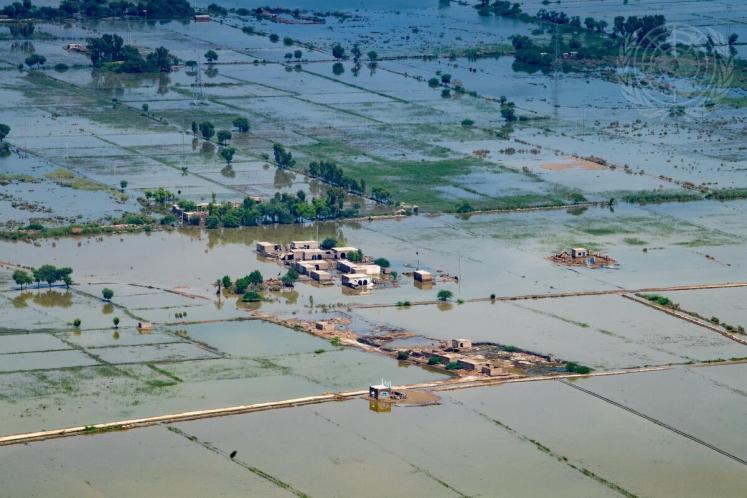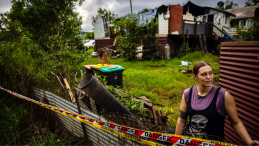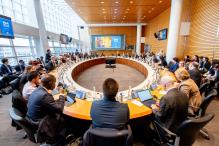As leaders concluded two weeks of negotiations and talks at the United Nations Climate Conference (COP27), they agreed to establish and operationalize a 'loss and damage' fund for countries most vulnerable to the impacts of climate change.
Described as a “historic” achievement, the creation of the fund has been received with a mix of exhilaration and relief on the one hand, and skepticism on the other. With no progress made in scaling back the use of fossil fuels – a critical measure to reduce greenhouse gas emissions – the fund has been perceived by some as more of a distraction.
Is the loss and damage fund a win for countries in the Global South?
While the fund has indeed been an important win for vulnerable nations, it alone will not be enough to address their climate vulnerability unless there are complimentary changes: a shift in power structures across climate finance to ensure that funding reaches communities on the ground; more effective engagement with local climate actors, including activists, civil society organizations, and communities; and a shift in political will so that the interests and needs of vulnerable populations are fundamentally addressed.
Climate action coming home?
The fund shows that southern voices are now heard – but we also need to ensure that we listen to these voices more closely and understand their priorities.
The persistent challenge in advancing equity and inclusivity in climate action has been to recast complex power dynamics between wealthier nations and poorer ones in favour of countries most vulnerable to the impacts of climate change.
Floods experienced in Pakistan earlier this year are a case in point: cropland and villages remain under water and nearly 10 million girls and boys still need immediate assistance.
There is much to learn here from the literature on humanitarian and development politics and the push for stronger awareness of local contexts by international actors. The 'loss and damage' fund, on its own, is a significant power shift but it also poses questions about the practicalities of implementation and how they will be addressed.
For example, who will provide climate finance? Who will receive it? And how will it be administered? Finally, what level of control and/or agency will vulnerable nations have over these processes?
Navigating complexity
Conflict-affected contexts are an example of the complexities inherent to defining which countries should be receiving the funds and what should be funded. Research by ODI has pointed out that more than half of the twenty-five countries most vulnerable to the impacts of climate change are conflict-affected, which often struggle to access finance.
The transnational impacts of climate change are another key issue that needs to be considered; we have seen how social unrest in one country can be connected to climate change impacts elsewhere. For example in Egypt in 2010 when the country's main trading partner for wheat, Russia, could not export due to a major drought.
Moreover, we need to develop more holistic responses to climate change; not only repairing physical infrastructure but also addressing far-reaching societal and economic impacts. Rebuilding damaged structures and paying out insurance will not help climate-vulnerable countries navigate deepening inequities, rising conflict over resources, and internal displacement.
Defining success matters
The 'loss and damage' fund also means different things to different actors, and therefore requires clear metrics to define progress. We need to avoid a repeat of The Grand Bargain at the World Humanitarian Summit, for instance, which did not have its value add or scope clearly articulated. Moving forward, the fund will require a much clearer definition of success and greater clarity around its commitments and the political will underlying them.
'Loss and damage' itself lacks a clear definition. When referring to loss and damage, the UNFCCC is referring to the negative consequences of climate change to vulnerable countries. However, this is contested by wealthier countries who argue that some climate change impacts are inevitable as they are 'locked into the earth’s system' and therefore do not warrant compensation.
There is also no real benchmarking for the fund or its administration and impact which requires a comprehensive, data-driven mechanism to create clear processes for funding distribution, oversight, and evaluation. This will be particularly difficult – given that data on climate variability and the impact of climate change is limited in the Global South, especially for vulnerable populations.
Furthermore, issues around reparations and admission of responsibility are still heavily contested by wealthier nations. While the former have advocated for compensation as a key remedy, the latter have rejected any notion of liability.
A way forward
The loss and damage fund is a win for southern nations but its effectiveness requires further action and a commitment by the UN and wealthier nations to change policies and systems from a perspective of equity and inclusivity.
This means further investments in building robust data infrastructure on the impacts of climate change in vulnerable countries, understanding local needs and priorities, removing barriers that limit access to finance (especially for marginalized groups), a strong awareness of local political economies and the transnational impacts of climate change, and finally, cultivating the global political will needed to support the operationalization of the fund.
Suggested citation: Sherine El Taraboulsi-McCarthy, Anh Vu and Irina Federenko-Aula., "COP27 and the Path Ahead: Is the 'Loss and Damage' Fund a Win for the Global South?," UNU-CPR (blog), 2022-12-21, 2023, https://unu.edu/cpr/blog-post/cop27-and-path-ahead-loss-and-damage-fund-win-global-south.





